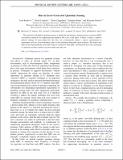Bias in Error-Corrected Quantum Sensing
Author(s)
Rojkov, Ivan; Layden, David; Cappellaro, Paola; Home, Jonathan; Reiter, Florentin
DownloadPublished version (362.4Kb)
Publisher Policy
Publisher Policy
Article is made available in accordance with the publisher's policy and may be subject to US copyright law. Please refer to the publisher's site for terms of use.
Terms of use
Metadata
Show full item recordAbstract
The sensitivity afforded by quantum sensors is limited by decoherence. Quantum error correction (QEC) can enhance sensitivity by suppressing decoherence, but it has a side effect: it biases a sensor's output in realistic settings. If unaccounted for, this bias can systematically reduce a sensor's performance in experiment, and also give misleading values for the minimum detectable signal in theory. We analyze this effect in the experimentally motivated setting of continuous-time QEC, showing both how one can remedy it, and how incorrect results can arise when one does not.
Date issued
2022Department
Massachusetts Institute of Technology. Department of Nuclear Science and EngineeringJournal
Physical Review Letters
Publisher
American Physical Society (APS)
Citation
Rojkov, Ivan, Layden, David, Cappellaro, Paola, Home, Jonathan and Reiter, Florentin. 2022. "Bias in Error-Corrected Quantum Sensing." Physical Review Letters, 128 (14).
Version: Final published version